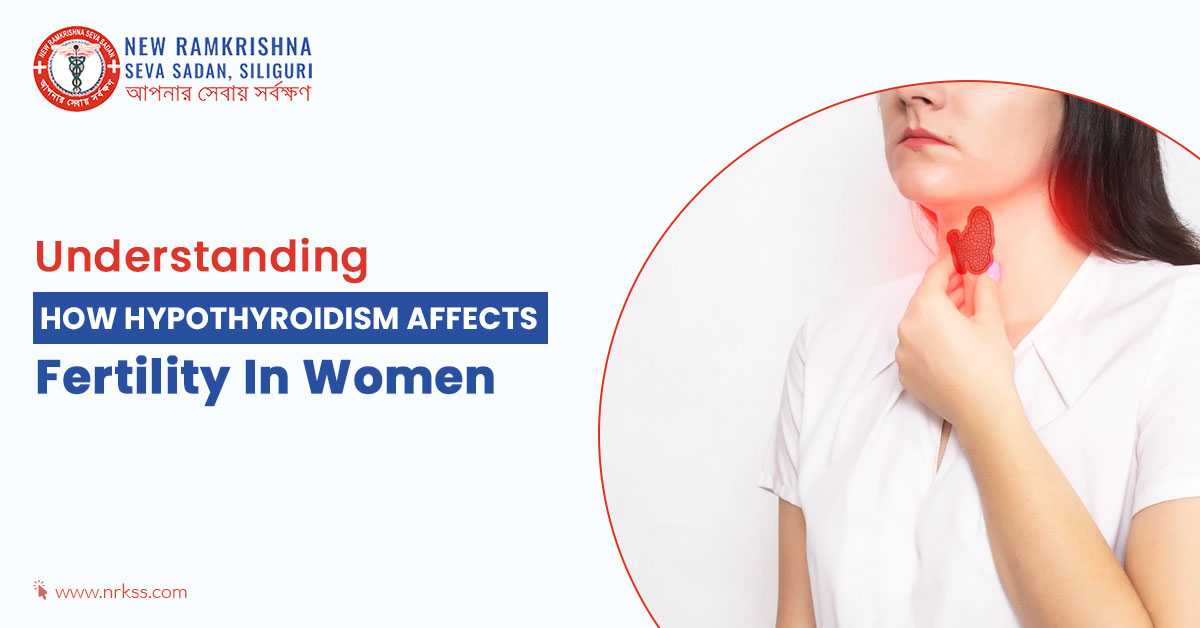Thyroid disorders such as hyperthyroidism and hypothyroidism are chronic endocrine disorders that can hugely interfere with your reproductive health. You must know that hypothyroidism is the most common thyroid disorder that has been associated with female infertility. Not only metabolic function and hormone production but the thyroid gland also plays a major role in ensuring overall reproductive health by regulating ovulation and menstrual cycle. If you suffer from hypothyroidism then without any delay visit a gynecologist in Siliguri for routine check-ups.
Hypothyroidism or underactive thyroid develops when the thyroid gland stops producing sufficient levels of thyroid hormones. Weight gain, tiredness, puffy face, muscle weakness, memory problems, dry skin, and constipation are some of the warning signs of hypothyroidism that can help you get timely intervention. Through proper diagnosis and treatment, you can stop the negative impacts of this disorder on your fertility outcomes.
Impacts Of Hypothyroidism In Female Infertility
- Anovulation
One of the most detrimental effects of hypothyroidism over infertility is anovulation. You must note that thyroid hormones play a significant role during follicular development and ovarian function and if your body doesn’t get enough hormones then it can interfere with these functions. Anovulatory cycles can reduce your fertility rate and you may require medications to induce ovulation. This is because, without ovulation, it is not possible to attain a successful pregnancy.
- Menstrual irregularities
If you experience any menstrual irregularities then without any delay you must visit the best gynecologist hospital in Siliguri since it can be a warning sign of hypothyroidism. Women with low thyroid hormones often suffer from infrequent, absent, or irregular menstrual cycles that can deteriorate reproductive health. Untreated hypothyroidism can lead to ovulation impairment due to the improper menstrual cycle.
- Hormonal imbalance
Another impact of hypothyroidism that significantly reduces female fertility rates is hormonal imbalance. Women suffering from this thyroid condition often have an imbalance in the reproductive hormones which include luteinizing hormone, follicle-stimulating hormone, progesterone, and estrogen. If you experience an imbalance in these hormones then it may affect your follicular development, menstrual cycle, as well as ovulation. These factors altogether will reduce your fertility rates.
- Poor endometrial health
Endometrium or the uterine lining is one of the main reproductive parts that plays a vital role during embryo implantation. However, if you’re suffering from hypothyroidism then the endometrial health may degrade. This thyroid condition has been associated with high risks of changes in endometrial thickness. Due to this improper thickness, it becomes quite difficult to attain successful implantation which can also contribute to an increased likelihood of miscarriage.
- Ovulatory dysfunction
A successful conception is also linked with the quality of the eggs that have been released by the ovaries. Herein, the chances of suffering from ovulatory dysfunction increase if hypothyroidism is left uncontrolled. As a result, this dysfunction will decrease the chances of conception due to the poor quality of the released eggs. In most cases, the mother becomes unable to sustain a full-term pregnancy as there is always a higher chance of miscarriage.
- High chances of pregnancy complications
If you’re unaware of the fact that you’re suffering from hypothyroidism then you may experience various pregnancy complications. Along with a higher likelihood of miscarriage, this health issue also leads to gestational hypertension, preeclampsia, placental abnormalities, and preterm labor. You should know that this condition can also impact the health state of the baby while affecting cognitive development and brain development. These factors together can reduce your fertility rates while making your pregnancy high-risk.
Screening and lifestyle modifications recommended by the gynecologist in Siliguri are crucial to managing hypothyroidism and its associated reproductive complications. Along with medications, exercise, proper sleep, a balanced diet, smoking cessation, and stress management are some of the effective factors that can regulate the production of thyroid hormones and improve your fertility rates.





